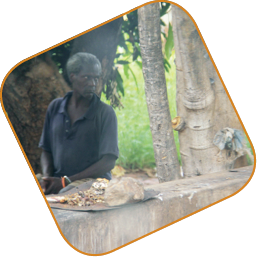5(B). Community violence
Neighbours laugh at me and my husband. They say we’re mental, we’ll kill our child, we’re criminals.
The pervasive stigma about mental distress, previously reported in many studies, was confirmed by our investigation as being a serious and lifelong impediment for people perceived as having a mental health issue, and for their families.61 Many people told monitors about the difficulties they faced in their communities:
Testimonies
It’s a big problem. Neighbours laugh at me and my husband. They say we’re mental, we’ll kill our child, we’re criminals.
The community are difficult. He’s come back running from them. Last November he was hit and had a broken tooth. But if we keep him inside he becomes violent. He’s been beaten several times in the last year.
The challenge is that people have this perception that if you are a person with mental health disability… they do not consider you as part of society.
Stigma is real and is there, you find that in an African setup maybe somebody has a mental challenge they will say ‘Alipena’ meaning he or she is mad or ‘Chofunta’ meaning that guy is crazy, he has got no brains.
I think people have a lot of stigma and discrimination […] if I’m walking; people are pointing fingers and are laughing.
Stigma is not only an emotional and social affliction but causes increased levels of violence. MHUNZA conducted a focus group discussion with people with mental health issues and their relatives to identify human rights violations in the community.62 Women reported being beaten by their husbands and their in-laws, and talked about physical and sexual abuse by their relatives and others in their community. Male participants reported being bullied, teased, harassed and stoned by community members.
The results of abuse were apparent when monitors met a female patient at Chainama Hills Hospital whose face was swollen. She said that she had been beaten in her local community. In a different ward, monitors met an elderly carer who explained how he took his male relative to a school, “but he was beaten, and then he’d fight back, so he had to leave.” A clinical officer out of Lusaka set out the stark reality:
Most of our patients have physical injuries. […] We had one patient that was beaten in town in 2009, he died the same day. The following year one patient absconded and was found dead in a brutal killing. Relatives don’t beat to kill, but others can do.
 A man at Livingstone Psychiatric Hospital who spent most of his days like this since 2004 because relatives has neglected him. 29 January 2014 © MDAC.
A man at Livingstone Psychiatric Hospital who spent most of his days like this since 2004 because relatives has neglected him. 29 January 2014 © MDAC.
61 Kapungwe et al., MHAPP Research Programme Consortium, “Mental illness – stigma and discrimination in Zambia”, 2010, 192–203.
62 MHUNZA held a focus group in Lusaka on 23 March 2011. Ten women with mental health issues participated (age range, 18–60 years) as did six men with mental health issues (age range 25–58). Nine relatives also took part (age range 42–67).

